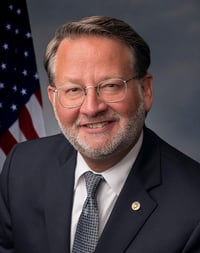
Presses for Answers on American Overreliance on Foreign Manufacturers for Medical Supplies
Peters: “This pandemic has exposed our country’s reliance on foreign countries to provide critical medical supplies to us – particularly China.”
Peters: “This is a serious national security vulnerability. And the pandemic has only further highlighted just how significant this risk is to the health and safety of the American people.”
WASHINGTON, DC – U.S. Senator Gary Peters, Ranking Member of the Homeland Security and Governmental Affairs Committee, today helped convene a hearing to examine the role of the Strategic National Stockpile in the United States’ response to the Coronavirus pandemic. Peters emphasized that effectively maintaining the Strategic National Stockpile and ensuring the federal government is prepared to protect Americans’ health and safety in an emergency is a matter of national security. Peters also pressed the panel of former government officials and infectious disease experts on the consequences of America’s overreliance on foreign manufacturers, such as China, for critical drugs and medical supplies. During his questions, Peters highlighted legislation he introduced to strengthen our medical supply chain and bring manufacturing of critical supplies back to the United States. In a 2019 report, Peters raised alarm about the national security risk of our reliance on foreign suppliers, and made recommendations to increase our domestic manufacturing capacity for key medications and supplies.
“It is abundantly clear that the federal government was not fully prepared to address a crisis on the scale of the Coronavirus pandemic. And the result is the tragic loss of 120,000 of our fellow Americans, and millions of families who have suffered the consequences,” said Senator Peters. “Ensuring the preparedness of the Strategic National Stockpile is an issue of national security and should be treated as such. We cannot allow a disaster of this magnitude to catch our government off guard again.”
Below are videos of Peters’ opening remarks and his questions on how the nation’s overreliance on foreign manufacturers contributed to America’s struggles to replenish the Strategic National Stockpile.
video of Senator Peters’ opening remarks.
video of Senator Peters’ questions to the panel.
Text of Peters’ opening statement as prepared for delivery is copied below:
Over the past several months, the United States has faced an almost unprecedented challenge, fighting a deadly virus that has infected millions and taken the lives of more than 120,000 Americans.
A pandemic can overwhelm even the most prepared communities.
That is why we have the Strategic National Stockpile, the nation’s largest store of lifesaving pharmaceuticals and medical supplies, to ensure the federal government has the resources to help states protect the health and safety of Americans during public health emergencies.
But the scale of the Coronavirus pandemic depleted our national stockpile in just a matter of weeks, leaving state and local governments scrambling to acquire the masks, gloves, and other supplies they so desperately needed to keep people safe.
Many communities facing the highest rates of infection struggled to obtain the supplies they needed, including in my home state of Michigan.
Instead of providing a coordinated, national approach that effectively used the Strategic National Stockpile and other tools to acquire and distribute supplies nationwide, the President told states that they were on their own. That move forced states to compete against each other and the federal government for lifesaving medical supplies that were already in shortage around the world.
Since this crisis began, Congress has passed several supplemental emergency appropriations bills to rebuild the stockpile. While this funding will help provide some stability, there is no question that our nation would have been better positioned to tackle the pandemic if Congress and both the current and prior Administrations had invested more in the stockpile before crisis struck.
It is abundantly clear that the federal government was not fully prepared to address a crisis on the scale of the Coronavirus pandemic. And the result is the tragic loss of 120,000 of our fellow Americans, and millions of families who have suffered the consequences.
Ensuring the preparedness of the Strategic National Stockpile is an issue of national security and should be treated as such. We cannot allow a disaster of this magnitude to catch our government off guard again. We must provide steady funding to all pandemic response efforts and also ensure the Strategic National Stockpile is well maintained and prepared to address a broad range of possible threats.
We must improve the communication between states and the federal government regarding available resources and strengthen the federal government’s role in managing supplies during this and future crises.
Finally, we must also take steps to address our overreliance on foreign manufacturers of critical drugs and medical supplies.
This is a serious national security vulnerability. And the pandemic has only further highlighted just how significant this risk is to the health and safety of the American people.
Today’s discussion will help us identity and prioritize critical decisions and investments to ensure we can continue to combat the Coronavirus as well as emergencies of the future. I look forward to hearing from all of you and to working alongside you to address these daunting challenges. Thank you.
###













